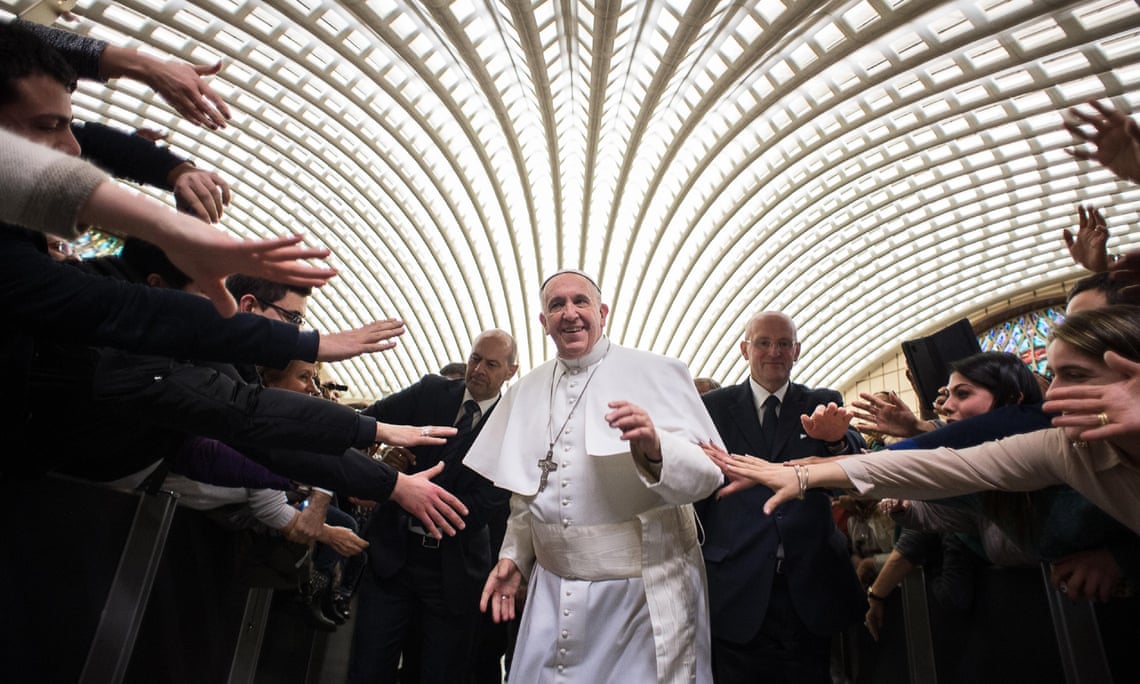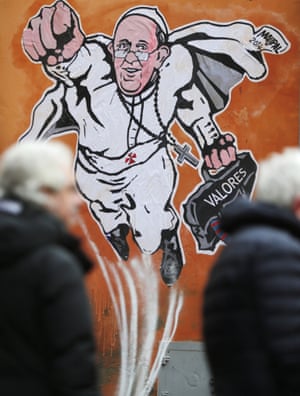Untraceable cash transfers and a culture of secrecy made the Vatican bank one of the world’s most notorious financial institutions. But Pope Francis’s attempts at reform are meeting ferocious resistance
Scarano, a suave, handsome priest known for his extravagant lifestyle (his nickname among other priests was Monsignor Cinquecento, My Lord Five Hundred, because of his habit of carrying only €500 banknotes), was head of accounting at the Amministrazione del Patrimonio della Sede Apostolica (APSA) – the body that then managed the Vatican’s property holdings and controlled its purchasing and personnel departments. His arrest made front-page news. He was accused of trying to smuggle €20m on a private plane across the border from Switzerland in a money-laundering conspiracy involving the Vatican bank, an agent of Italy’s secret services and an Italian broker under suspicion for running a Ponzi scheme.
Doubts about Scarano had first been aroused six months earlier, when he had reported a burglary at his apartment in the city of Salerno, south of Naples. Paintings from his art collection had been stolen, he claimed. When the police arrived at the 17-room apartment on Via Romualdo Guarna, in one of the city’s wealthiest neighbourhoods, they were startled by its opulence. It was furnished with valuable antiques, and a spectacular display of art lined the walls in hallways divided by Romanesque columns. Scarano’s collection included a painting attributed to Chagall. Police reports estimated the missing artworks were worth €6m.
How could a bureaucrat priest on a stipend of €36,000 a year afford such luxuries? They were all “donations”, Scarano told the police. Investigators were convinced they were gifts – along with perks including trips, cruises and, reportedly, massages – from banks soliciting Vatican business. Scarano had €2.3m in his various personal accounts.
But the Scarano scandal had much wider implications. Investigators suspected that he had been operating APSA as a “parallel bank”, through which Italian VIPs could avoid taxes and the mafia launder the profits of illegal activity. Scarano denied it all but, just a few days after his arrest, two of the Vatican bank’s three top officials suddenly quit their jobs.
A month later, in July 2013, Pope Francis was on his way back to Rome after attending World Youth Day in Brazil. On the papal plane he held an impromptu press conference. Someone asked him about Scarano. Was it not time, the reporter asked, to close the Vatican bank? Francis did not attempt to dismiss the affair. “These are scandals,” he said, “and they do harm.”
Nefarious activity had been going on a long time inside the Vatican bank. Many cardinals had mentioned their anxieties about corruption in the discussions that preceded Francis’s election as pope. But the new pope’s avowed priority was to shift the Roman Catholic church away from its obsession with sexual ethics and to embrace the wider world, most particularly the poor and the marginalised, with a message of love and mercy. Internal corruption could wait. “I was planning to address the finances next year,” he told the Vatican press corps. But Scarano’s arrest had changed the agenda. Suddenly, church finances were in the public spotlight. “These things happen when you’re in governance: you try to go in one direction, but then someone throws you a ball from another direction, and you have to bat it back.”
Yet things were not quite as simple as Pope Francis was making out. Behind the scenes he had already launched a quiet revolution. The man who wears a plastic watch and takes his breakfast in a Vatican cafeteria had set about simplifying the Vatican’s labyrinthine bureaucracy from the outset. As well as reducing public pomp, he demanded new levels of accountability in private. He imposed a recruiting freeze. He was in some ways more worldly than many expected: he had a track record of tackling financial malpractice in the church in Buenos Aires. The self-serving bureaucrats and corrupt networks operating within the Vatican bank system had no idea what was to come.
Nefarious activity had been going on a long time inside the Vatican bank. Many cardinals had mentioned their anxieties about corruption in the discussions that preceded Francis’s election as pope. But the new pope’s avowed priority was to shift the Roman Catholic church away from its obsession with sexual ethics and to embrace the wider world, most particularly the poor and the marginalised, with a message of love and mercy. Internal corruption could wait. “I was planning to address the finances next year,” he told the Vatican press corps. But Scarano’s arrest had changed the agenda. Suddenly, church finances were in the public spotlight. “These things happen when you’re in governance: you try to go in one direction, but then someone throws you a ball from another direction, and you have to bat it back.”
Yet things were not quite as simple as Pope Francis was making out. Behind the scenes he had already launched a quiet revolution. The man who wears a plastic watch and takes his breakfast in a Vatican cafeteria had set about simplifying the Vatican’s labyrinthine bureaucracy from the outset. As well as reducing public pomp, he demanded new levels of accountability in private. He imposed a recruiting freeze. He was in some ways more worldly than many expected: he had a track record of tackling financial malpractice in the church in Buenos Aires. The self-serving bureaucrats and corrupt networks operating within the Vatican bank system had no idea what was to come.
* * *
The Vatican bank is housed in a medieval tower that once served as a dungeon. Its lower floors have no windows. To gain admittance you have to leave Italy and cross the road to the Vatican through the gate of the Porta Sant’Anna. There you are checked by two Swiss Guards, and pass through a two-door security kiosk set in a plate-glass window. Inside, by the manned reception desk, there is a cash machine in the wall. The language that flashes up asking you to insert your cashcard is Latin: “Inserito scidulam quaeso ut faciundam cognoscas rationem”. The semiotics of all this are clear: communication between what is inside this place and the outside world will be made as difficult as possible.
“It is used mainly by religious orders which are too small to have their own finance departments, by employees and pensioners of the Holy See, and by accredited diplomats. They can deposit or send money very quickly and cheaply,” said Wieser. “The other function of the IOR is to safeguard the patrimony of the religious orders who own 85% of the bank’s funds.” In 2013, religious orders had deposited around $3.1bn for safekeeping. The IOR paid out around 1% in interest on that but, on average, invested the money deposited in government bonds at an average of 3.3%. That generated profits of more than $70m.
“In banking terms it’s a rather pedestrian service,” said Wieser, who trained as a psychologist as well as in economics. Then he added, with unexpected jocularity: “The main problem was incompetence. The sex and crime was only a little aspect.”
“In banking terms it’s a rather pedestrian service,” said Wieser, who trained as a psychologist as well as in economics. Then he added, with unexpected jocularity: “The main problem was incompetence. The sex and crime was only a little aspect.”


No comments:
Post a Comment